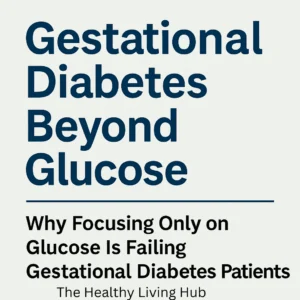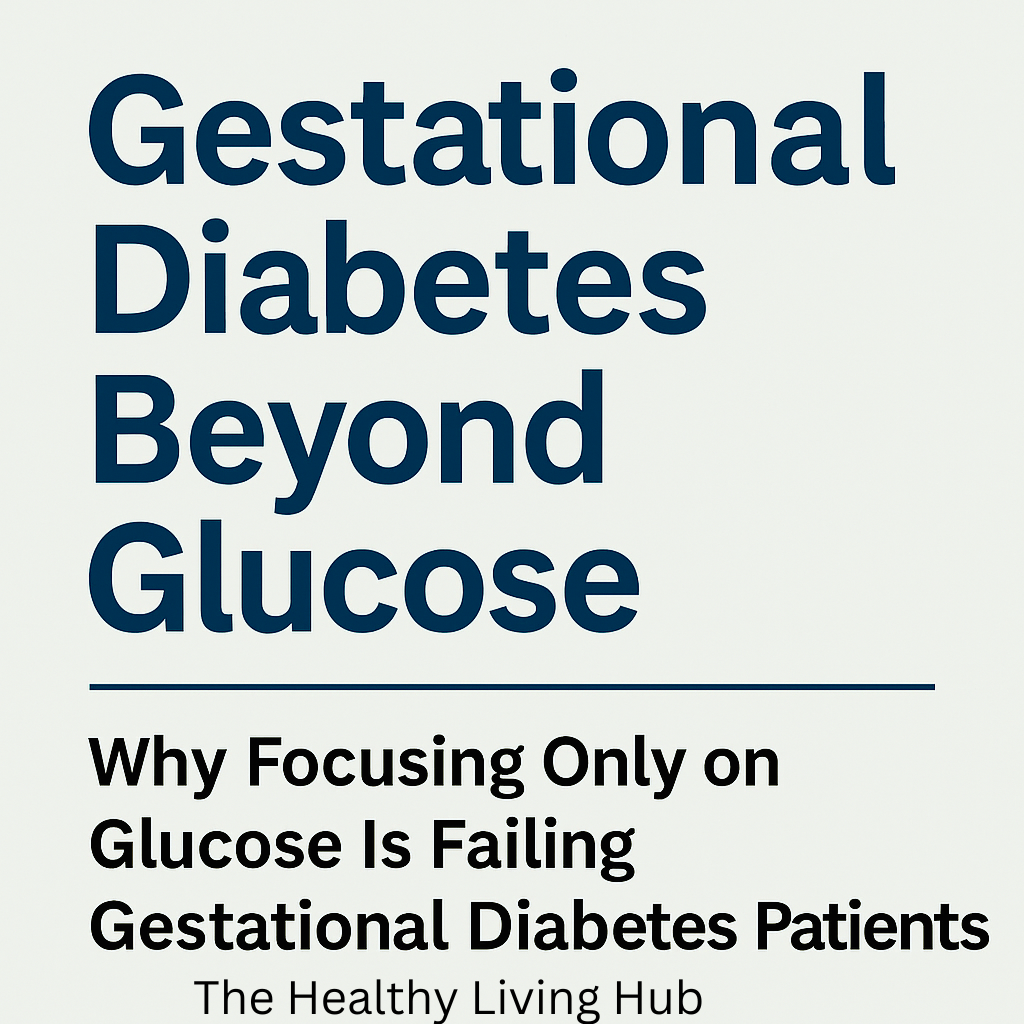Gestational diabetes is usually seen only through the lens of blood sugar numbers. For years, most healthcare approaches have been centered around monitoring glucose levels, adjusting diets to manage sugar intake, and sometimes prescribing insulin if necessary. But Gestational Diabetes Beyond Glucose tells a different story — one where focusing only on sugar misses key factors that affect both mother and baby.
New research is revealing that this glucose-only mindset often overlooks other critical biological, lifestyle, and environmental influences. These missing elements can make the difference between a smooth pregnancy and complications that affect long-term health for both mother and child. Understanding this broader picture is essential if we want better outcomes.

Understanding Gestational Diabetes Beyond Glucose
Gestational diabetes develops during pregnancy and affects how the body processes sugar. Traditionally, the goal has been to keep blood glucose within a “safe” range. This is usually done through diet control, regular testing, and sometimes medication.
While glucose control is important, it’s not the whole story. Many pregnant individuals with “normal” sugar levels still face complications, and some with mild elevations don’t. This suggests that there are deeper mechanisms at work beyond just sugar numbers.
Newer studies are showing that inflammation, insulin resistance, placental health, nutrient balance, and metabolic signaling all play vital roles. A truly effective approach looks at these elements together — not in isolation.
The Limitations of a Glucose-Only Approach
For decades, treatment protocols have focused on tracking fasting and post-meal blood glucose levels. Women are given glucometers, dietary plans, and in some cases, insulin injections. But this narrow approach has several problems:
Delayed Diagnosis: Many cases are only identified after glucose levels rise, missing earlier warning signs like insulin resistance or abnormal placental signals.
One-Size-Fits-All Diets: Generic low-sugar diets don’t account for individual differences in metabolism, activity levels, or nutritional needs.
Missed Risk Factors: Inflammation, lipid levels, hormonal shifts, and gut health are often ignored even though they affect pregnancy outcomes.
Limited Long-Term Impact: Managing sugar alone may help during pregnancy but doesn’t address underlying metabolic dysfunction that can persist after birth.
A glucose-only model is like treating a symptom without fully understanding the disease. It’s helpful — but incomplete.
Beyond Glucose: The Broader Biological Picture
When we look at Gestational Diabetes Beyond Glucose, we see a complex network of systems working together. These include:
Insulin Resistance and Placental Function (H5)
Gestational diabetes involves more than sugar — it’s also about how cells respond to insulin and how the placenta manages nutrient exchange. A poorly functioning placenta can affect how glucose and other nutrients flow to the baby, influencing growth patterns and future metabolic risk.
Inflammation and Hormonal Signals (H5)
Pregnancy naturally involves immune and hormonal changes. Excess inflammation can disrupt insulin signaling, while hormones like cortisol and human placental lactogen affect how glucose is managed. Chronic low-grade inflammation may worsen outcomes even if blood sugar readings look “normal.”
Nutrient Imbalances (H5)
Micronutrients such as magnesium, vitamin D, and omega-3 fatty acids influence insulin sensitivity and inflammation. Diets focusing only on sugar often miss these important nutritional factors that support healthy pregnancy outcomes.
Gut Microbiome (H5)
Emerging research shows that gut bacteria play a role in metabolic health. A disrupted microbiome can affect glucose tolerance and inflammation, but this factor is rarely addressed in standard gestational diabetes care.
Lifestyle Interventions Beyond Sugar Control
Blood sugar monitoring and dietary changes are essential, but lifestyle plays a broader role too. Activities such as post-dinner walks have been shown to significantly improve insulin sensitivity and stabilize overnight blood sugar levels.
👉 Read our detailed guide on the benefits of a 10-minute evening walk after dinner to understand how small changes can make a big difference.
Other important lifestyle strategies include:
Regular Movement: Gentle exercise like prenatal yoga, swimming, or walking improves insulin action.
Stress Reduction: High stress can increase cortisol, affecting glucose control. Practices like deep breathing, mindfulness, or light stretching can help.
Sleep Quality: Poor sleep increases insulin resistance; improving sleep routines is often overlooked in care plans.
Personalized Nutrition vs. Generic Diet Plans
Typical gestational diabetes advice revolves around cutting sugar and refined carbs. While this helps, it ignores the fact that each person’s body responds differently to foods. Personalized nutrition focuses on:
Individual blood sugar responses to different foods
Cultural dietary patterns and preferences
Macronutrient balance (carbs, fats, proteins)
Micronutrient adequacy (vitamins, minerals, antioxidants)
👉 For a deeper dive into how specific nutrients can influence disease risk, check out our evidence-backed guide on diet for colorectal cancer prevention.
For example, two pregnant women may eat the same bowl of oats — one may experience a sugar spike, while the other does not. Personalized nutrition helps tailor the diet to the body’s actual responses, not just generalized rules.
Long-Term Impact on Mothers and Babies
Gestational diabetes is not just a short-term pregnancy issue. Research shows that children born to mothers with poorly controlled gestational diabetes face a higher risk of obesity, metabolic syndrome, and type 2 diabetes later in life. Mothers themselves are at greater risk of developing type 2 diabetes within 5–10 years postpartum.
A care model that goes beyond glucose addresses these long-term risks by improving overall metabolic health, not just temporary sugar readings. By tackling inflammation, nutrient deficiencies, lifestyle factors, and placental health, the risk of future disease can be significantly lowered.
Integrating Medical and Lifestyle Approaches
The most effective way to manage gestational diabetes is through a comprehensive approach:
Medical monitoring for glucose levels and any complications
Targeted dietary changes with a focus on nutrient quality
Physical activity adapted for pregnancy
Addressing inflammation through nutrition and lifestyle
Supporting gut health through fiber-rich and probiotic foods
Considering hormonal and placental factors in medical assessments
This integrated model offers a better chance of healthy outcomes for both mother and child.
The Future of Gestational Diabetes Care
Modern research is moving toward precision medicine — an approach that considers individual biology, lifestyle, and environment. For gestational diabetes, this means:
Earlier risk identification through biomarkers beyond glucose tests
Tailored nutrition plans
Personalized activity guidelines
Attention to inflammation, microbiome, and hormonal factors
Ongoing support after delivery to prevent long-term complications
This represents a major shift from the traditional glucose-centric model toward a more complete and effective way of supporting pregnant women.
Conclusion: A New Way Forward
It’s time to move past sugar-only thinking. Gestational Diabetes Beyond Glucose emphasizes that blood sugar control is necessary but not sufficient. A broader, more holistic approach — combining medical care, personalized nutrition, lifestyle strategies, and long-term follow-up — can lead to healthier pregnancies and better futures for both mothers and children.
👉 Take a proactive step: start integrating simple habits like evening walks, nutrient-rich meals, stress management, and open conversations with your healthcare team about comprehensive care. Every small change matters.

